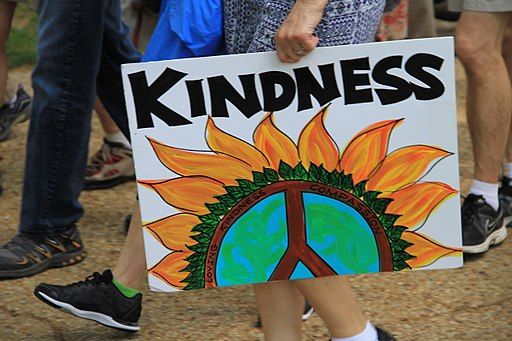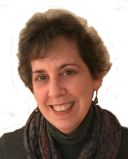
My mother died last week. During her final days, I was repeatedly astonished by how kind people were. The consulting physician at the hospital really listened to her and took the time—a lot of time—to talk with her about her options. He’s a surgeon, not a palliative care doc, and I didn’t expect him to slow down, listen, explain, clarify, joke, converse, listen some more, explain again. I didn’t expect him to come back several more times or give Mom time to consider and reconsider her options. I didn’t expect him to express support for her decision to not have surgery. Maybe Mom reminded him of his 89-year-old mother. Maybe he’s simply a good man. But his kindness to my mother was also kindness to me and helped me be more patient and more understanding. Kindness breeds kindness.
The hospital chaplain came to see Mom. Debbie is a friend of Mom’s, and since Mom was asleep when she came, she said she’d come back. I left to get lunch and followed my instinct to go to Debbie’s office instead. She invited me in, and I sat and cried for half an hour, telling her about the ways that Mom’s situation felt final, though it wasn’t necessarily, and about how sad I was to see her weak and in pain. She really listened to me and heard the undertow of fear. “Sometimes one loss brings back memories of other losses,” she ventured, which felt like permission to get to the fear of being overwhelmed, as I had been when my father died, and again when my husband died. Out it all spilled, all the old grief, the shame about mistakes I’d made, my sense that I needed to control my feelings and keep them to myself because I don’t want to burden anyone. I apologized for burdening her. She smiled. “Sharing your experience isn’t a burden,” she said. “It’s a way of being human.”
At the memorial service a week later, unexpected people appeared. My sister’s friend Shelley drove three hours to be with us for the service, and then three hours home. My friend Eileen’s father came, as he and his wife had come to my father’s service 23 years before. I took this to be a sign of respect for his peers, an unusual protocol, and it wasn’t until I talked with Eileen about it that I learned it was something different. As she said, “It was his way of telling you that he cares about you.” It hadn’t occurred to me that he had come for me, for my sake. When Eileen said that, I thought, “Oh, oh yes. It was a kindness for me.” Another man slipped into the service and after a moment I realized who it was: a man I knew years ago, when he was in better health. A friend had dated him in college. A soulful violinist, he had played at church on special occasions. He had cats. My mother had taken him under her wing when he began to struggle with mental illness. He had come, with some difficulty, to honor her. His doing so was achingly sweet.
When I came home after this momentous time, I was aware of wanting to be utterly alone, to have the opportunity to nurse my grief. But I also wanted to tell everyone about my mother, about what she was to me. I have good friends, who understand both impulses. They call, email, Skype. They make donations and send flowers. They invite me to dinner. Sharon and Pat, for example, suggested we get together so they could hear more about Mom, or we simply go to a movie together— whatever I needed and wanted. I want both. I want to go see A Wrinkle in Time, with its story of children and their mother, and the rather maternal witches; I want to remember my mother giving me that book when I was 10 and facing some other hard times. But I also want to tell Pat and Sharon about Mom. I’ve already sent them the obituary I wrote, but I also want them to read the eulogy, and hear all about the time in hospital and then back at the nursing home where she died. I want, I want, I want. I want my mother.
I thought I’d go back to work when I got home. I did go back to work, for two days. But I realized pretty quickly that although it felt good to be with my clients, and to hear about their lives, I got really tired and wasn’t able to concentrate well enough to be as helpful to them as they were to me. It was clear to me that I need to take some time off. I have told them, one by one, that I am going to do that. It’s been hard for me: I still have some sense that I should be all right, or that my grief should be managed in such a way that I only let it out when I want to, that old wish most grievers have.

Denial of grief hasn’t worked very well for me in the past, so I have decided to do what I know is best: tell people I need some time. And for some crazy reason, that’s all about my own vulnerability right now, I half-expected my clients to say, “You’re not a very good therapist, being away like this. I’m going to go see someone else.” I thought they would leave me and be angry and critical in the process. I was afraid of more abandonment. But instead, of course, what I got was still more kindness: “I’m so sorry for your loss,” and “Of course you need to take care of yourself,” and “I’m doing okay, and I’ll look forward to seeing you when you’re back to work.” And like my friends, they extended offers of help, sent sympathy cards, left a pot of soup on my doorstep.
As I dig out from the blizzard we had yesterday and think about my mother now in the great beyond, I’ll be kept warm by all that unexpected kindness, all that good in the world.


